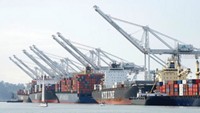Advertisement
Grab your lab coat. Let's get started
Welcome!
Welcome!
Create an account below to get 6 C&EN articles per month, receive newsletters and more - all free.
It seems this is your first time logging in online. Please enter the following information to continue.
As an ACS member you automatically get access to this site. All we need is few more details to create your reading experience.
Not you? Sign in with a different account.
Not you? Sign in with a different account.
ERROR 1
ERROR 1
ERROR 2
ERROR 2
ERROR 2
ERROR 2
ERROR 2
Password and Confirm password must match.
If you have an ACS member number, please enter it here so we can link this account to your membership. (optional)
ERROR 2
ACS values your privacy. By submitting your information, you are gaining access to C&EN and subscribing to our weekly newsletter. We use the information you provide to make your reading experience better, and we will never sell your data to third party members.
Policy
U.S. Chemical Industry Must Convert Barriers Into Bridges
by Greg Babe
July 28, 2010
| A version of this story appeared in
Volume 88, Issue 30
This guest editorial is by Greg Babe, president and chief executive officer of Bayer Corp. and Bayer MaterialScience, who serves on the American Chemistry Council’s executive committee and board of directors.
Major chemical plants that cost $1 billion or more are now almost exclusively being built overseas.
Many think the decline of the U.S. chemical industry is inevitable, as countries such as China and India beckon with cheap labor and fast-growing domestic markets. But that’s far from the whole story. If it were, we’d see declining public and political support for other U.S. industries, such as the automotive industry, that have seen their jobs going overseas. We haven’t.
As chemical production has moved to other countries, so have high-paying jobs. U.S. chemical industry employment has declined by more than 20% in the past two decades. In 1990, our industry employed 1 million people. Today, we employ 780,000. These jobs, in turn, support nearly 4 million supplier and other expenditure-induced jobs. Why aren’t Americans shouting, “Keep the chemical industry jobs here!”?
I think the answer is that there’s a chasm between our industry’s own expectations and what the public expects of and knows about the industry. And unless we act, the U.S. chemical industry could become irrelevant on the world stage in a decade or less. More than 96% of all manufactured goods, including products essential to our national security, are directly touched by our industry. Dependence on foreign chemical manufacturing, like our dependence on foreign oil, is not a sustainable model for our country.
Three barriers stand in the way of success: communication, politics, and behavior.
Most people don’t understand the chemical industry. Many fear it. Nonetheless, our industry has a good safety record. On average, chemical companies that follow the American Chemistry Council’s (ACC) Responsible Care initiative are four times safer than the rest of the manufacturing sector.
However, the Responsible Care program, now nearly 25 years old, has yet to capture our nation’s awareness. Worse yet, a recent ACC survey shows that four out of five chemical plant line workers are completely unaware of Responsible Care. So it’s hardly any wonder that the vast majority of the public and their federal and state representatives are unaware of the program.
We need to start a conversation and keep it going. Every chemical company must act to build mutual understanding among its many stakeholders and with opinion leaders of all kinds, including elected officials, regulators, nongovernmental organizations, plant communities, critics, and employees. We must listen to them, act on what we hear, and use every communications channel available. These channels must include the Internet and social media, which allow direct and unfiltered information exchange.
Paradoxically, even as public trust of government is diminishing, legislation—some of it ill-conceived—is growing. Perception can overpower reality as some critics paint the chemical industry as having a poor understanding of chemical risks. Far too often, the industry finds itself at the end of the legislative pipeline when it should be at the beginning, designing solutions for the future.
The industry must secure a place at the negotiating table early. It must continually advance the understanding of how chemicals affect human health and the environment. Only then can it ensure that legislation is based on sound science.
Next, the industry must take to a higher level all of its distribution and employee safety, facility security, and environmental protection processes. We must hold ourselves to the highest standards, admit where we have fallen short, and follow up with corrective action.
The gap that exists between where the U.S. chemical industry is today and where it needs to be is wide but not insurmountable. It’s time to turn our energies to breaking down barriers and building bridges of opportunity for our industry, our nation, and the world.




Join the conversation
Contact the reporter
Submit a Letter to the Editor for publication
Engage with us on Twitter